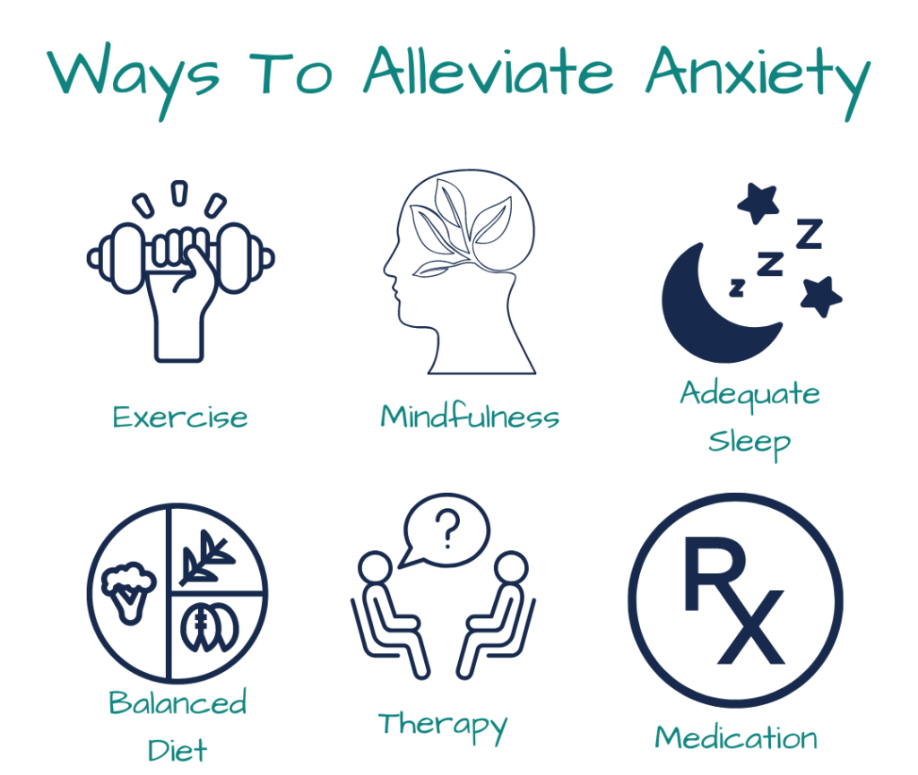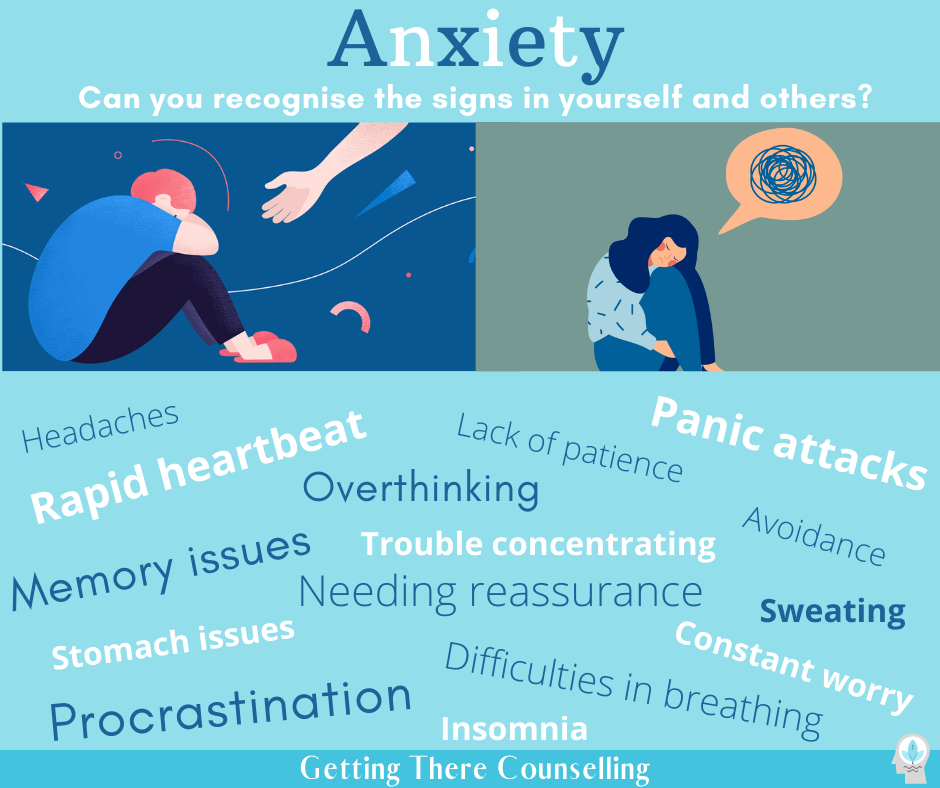To date, research has shown that yearly, 40 Million individuals experience an anxiety disorder!
The exact cause of anxiety is not fully understood, but it is believed to be a combination of genetic, environmental, and psychological factors.
People with a family history of anxiety disorders, those who have experienced a traumatic event, or those with a history of substance abuse may be more susceptible to developing an anxiety disorder.


Do you know what the three most common symptoms of generalised anxiety are?
The three most common symptoms to spot early on include:
Feeling restless, irritated, or nervous.
Having difficulty concentrating; mind feeling foggy and muddled.
Experiencing problems with sleep, such as difficulty getting to sleep or staying asleep or very poor sleep quality.


Anxiety & Depression
How does anxiety & depression really feel? What does it feel like to have anxiety and depression?
To get a better sense of what it’s like to have anxiety and depression, it can be helpful to hear from those who’ve actually experienced this personally.
It’s important to remember that whilst these difficulties are associated with a specific set of symptoms, anxiety and depression can be a very individual experience.
There are different types of anxiety and depression, and people experience different combinations of symptoms, have different triggers, and cope in different ways.
Anxiety and depression, as told by sufferers of anxiety or depression.
‘Depression is like going through life like you’re trying to wade through water. Everything is an effort. I just feel so sluggish and slow. And I’ve stopped doing all the things that I used to do - nothing feels good anymore.’
‘Depression to me is like drowning while everyone else is breathing. It’s also kind of like life in slow motion. The anxiety makes me feel like I'm being shackled and have no power or sense of existence. Depression is like being on the outside of everything.’
‘It feels like you can’t breathe in a room full of people because someone might stare at you if you make the tiniest noise. You feel like everyone is always talking about you, even though they usually aren’t.
'Depression is different for everyone, as is anxiety, but for me, depression is the feeling of falling into a hole and that hole getting bigger and bigger, and I can never scramble out of it. Then a big heavy lid gets slammed shut on me inside the hole'.

Breathe:
There are ways to calm your anxiety.
Know that feeling of your heart beating faster in response to a stressful situation. Or perhaps, instead, your palms get sweaty when you’re confronted with an overwhelming task or event.
That’s anxiety — our body’s natural response to stress.
If you haven’t recognised your triggers yet, here are a few common ones: your first day at a new job, meeting your partner’s family, or giving a presentation in front of a lot of people. Everyone has different triggers, and identifying them is one of the most important steps to coping and managing anxiety attacks. Identifying your triggers can take some time and self-reflection. In the meantime, there are things you can do to try to help calm or quiet your anxiety from taking over.
Quick ways to cope with anxiety If your anxiety is irregular and getting in the way of your focus or tasks, there are some quick natural remedies that could help you take control of the situation. If your anxiety is focused on a situation, such as being worried about an upcoming event, you may notice the symptoms are short-lived and usually subside after the anticipated event takes place.
Question your thought pattern. Negative thoughts can take root in your mind and distort the severity of the situation. One way is to challenge your fears, ask if they’re true, and see where you can take back control.
Practice focused, deep breathing. Try breathing in for 5 counts and breathing out for 5 counts for 5 minutes total. By evening out your breath, you’ll slow your heart rate, which should help calm you down. The 4-7-8 technique is also known to help anxiety.
Use aromatherapy. Whether in oil form, incense, or a candle, scents like lavender, chamomile, and sandalwood can be very soothing.
Aromatherapy is thought to help activate certain receptors in your brain, potentially easing anxiety.
Go for a walk or do 15 minutes of yoga. Sometimes, the best way to stop anxious thoughts is to walk away from the situation. Taking some time to focus on your body and not your mind may help relieve your anxiety. Write down your thoughts.
Writing down what’s making you anxious gets it out of your head and can make it less daunting. These relaxation tips are particularly helpful for those who experience anxiety sporadically. They may also work well with someone who has a generalised anxiety disorder (GAD) when they’re in a bind, too!
However, if you suspect you have GAD, quick coping methods shouldn’t be the only kind of treatment you employ. You’ll want to find long-term strategies to help lessen the severity of symptoms and even prevent them from happening.
Long-term strategy for coping with anxiety
If anxiety is a regular part of your life, it’s essential to find treatment strategies to help you keep it in check. It might be a combination of things, like talking therapy and meditation, or it might just be a matter of cutting out or resolving your anxiety trigger. Identify and learn to manage your triggers.
You can identify triggers on your own or with a counsellor. Sometimes they can be obvious, like caffeine, drinking alcohol, or smoking. Other times they can be less obvious. Long-term problems, such as financial or work-related situations, may take some time to figure out — is it a due date, a person, or the situation? This may take some extra support through counselling or with friends. When you do figure out your trigger, you should try to limit your exposure if you can.
If you can’t limit it — like if it’s due to a stressful work environment that you can’t currently change — using other coping techniques may help.
Some general triggers: a stressful job or work environment, driving or travelling, genetics — anxiety could run in your family, withdrawal from drugs or certain medications, side effects of certain medications, trauma phobias, such as agoraphobia (fear of crowded or open spaces) and claustrophobia (fear of small spaces) some chronic illnesses like heart disease, diabetes, or asthma chronic pain having another mental illness such as depression, caffeine or relationship issues
Do a daily or routine meditation. While this takes some practice to do successfully, mindful meditation, when done regularly, can eventually help you train your brain to dismiss anxious thoughts when they arise. If sitting still and concentrating is difficult, try starting with yoga.
Try supplements or change your diet. Changing your diet or taking supplements is definitely a long-term strategy. Research shows certain supplements or nutrients can help anxiety reduction.
These include lemon balm, omega-3 fatty acids, green tea, valerian root, and dark chocolate (in moderation). However, it can take up to three months before your body is actually running on the nutrition these herbs and foods provide. If you’re taking other medications, make sure to discuss herbal remedies with your doctor. Keep your body and mind healthy.
Exercising regularly, eating balanced meals, getting enough sleep, and staying connected to people who care about you are great ways to combat anxiety symptoms.
When is my anxiety harmful? Identifying what sort of anxiety you’re dealing with can be somewhat challenging because how one’s body reacts to perceived danger can be entirely different compared to another person.
It’s likely you heard anxiety as a blanket term for that general feeling of worry, nervousness, or unease. It’s often a feeling grown in response to an upcoming event that has an uncertain outcome. Every person deals with it at one time or another because it’s part of our brain’s response to a perceived danger — even if that danger isn’t real.
That said, there are times when anxiety can get serious and turn into anxiety attacks that initially feel manageable and then gradually build up over a few hours. (This is different from a panic attack, which is out of the blue and subsides.)